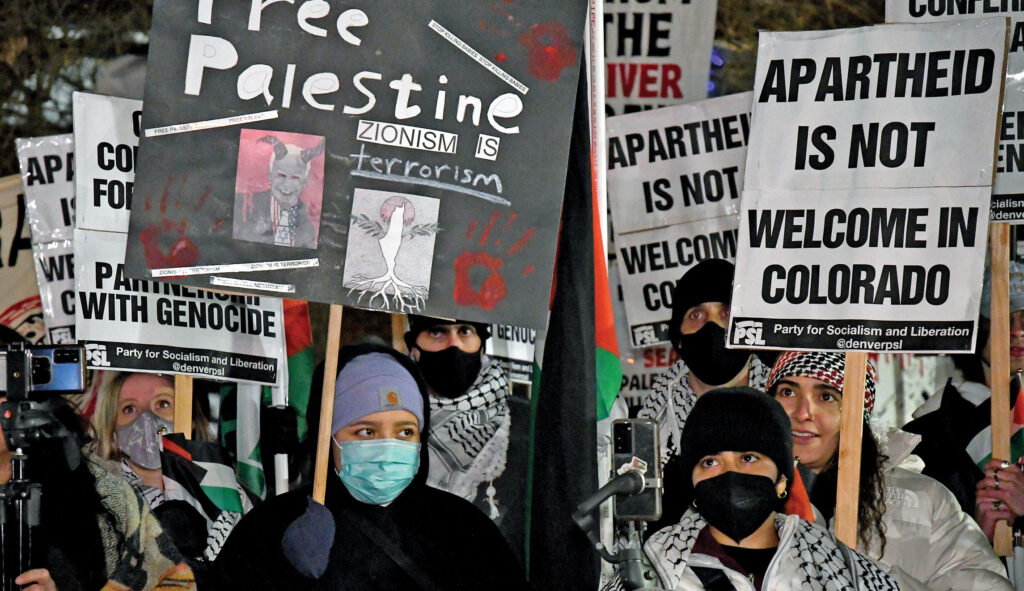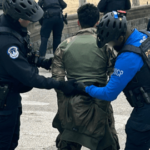

Immediately after Hamas’s Oct. 7 terrorist attacks on Israel, in which Hamas murdered and tortured 1,200 while capturing 240 hostages, celebrations of this “victory” over the Jewish state broke out in leftist bastions all over the United States. The firestorm of antisemitism on college campuses and in major cities ever since is unique in coming almost exclusively from left-wing sources. David Bernstein, founder and CEO of the Jewish Institute for Liberal Values, told the Washington Examiner he used to consider left-wing antisemitism “like climate change, slow-moving and corrosive. But that’s no longer the case. On the Left, antisemitism is now a complete tsunami.”
Dr. Charles Small, executive director of the Institute for the Study of Global Antisemitism and Policy, told the Washington Examiner that intolerance in the U.S. “was even shocking to me, [and] I knew that antisemitism was increasing exponentially.”
Hatred on college campuses has had a staggeringly damaging effect on Jewish students. A survey by the Anti-Defamation League and Hillel International found that following Hamas’s pogrom, only 46% of Jewish students feel “physically safe” and 33% feel “emotionally safe” on campus. A reported 73% have witnessed antisemitism in the 2023-24 school year.
Research from Small and the ISGAP and indications from foreign adversary watchdogs point to the likelihood that overseas provocateurs have played a role in creating today’s intolerance. Terrorist propaganda, possibly from terrorists themselves, is being shared on U.S. campuses. Some countries, including Qatar, Iran, and China, are involved in long-term efforts to stoke college antisemitism. In more recent efforts, Russia, Iran, and China have worked online to foment further discord, widening the fractures in American society. Identifying and counteracting these efforts is a vital necessity if we are to create an environment in which American Jews are not attacked for events unfolding in the Middle East.
Terrorism speaks on campus
Long before the Oct. 7 atrocities, chapters of Students for Justice in Palestine were notorious among openly antisemitic pro-Palestinian groups on college campuses. During the 2022-23 school year, the ADL found that SJP chapters were responsible for 423 of 665 documented anti-Israel incidents on campuses. A SJP chapter on campus is “one of the strongest predictors of perceiving a hostile climate toward Israel and Jews,” according to a 2016 study from Brandeis University’s Cohen Center for Modern Jewish Studies.
Five days after the Oct. 7 attacks, National SJP released a Day of Resistance Tool Kit that ignored the Islamist outrages and instead sermonized on how “our people have broken down the artificial barriers of the Zionist entity, taking with it the facade of an impenetrable settler colony and reminding each of us that total return and liberation to Palestine is near.” National SJP boasted its support for Hamas and noted that “we as Palestinian students in exile are PART of this movement, not in solidarity with this movement.”
These gloating and defiant statements prompted blowback. Gov. Ron DeSantis (R-FL) argued that the tool kit was “material support to terrorism.” A legal battle is underway in Florida after the University of Florida’s SJP chapter sued DeSantis following a “deactivation order” from the university chancellor, which it claimed “violates the students’ free speech rights.” In an article written before the SJP’s lawsuit, Adam Kissel of Minding the Campus discussed the weakness of a free speech defense of SJP’s support for Hamas. “While strikes may be protected by labor law and demonstrations are clearly protected by the First Amendment, ‘armed struggle’ is clearly not,” Kissel wrote.
SJP has a history of sharing inflammatory content, including from the Resistance News Network, which the ADL describes as “a radical anti-Zionist English-language channel on Telegram and Instagram that promotes violence against Israel.” RNN emerged in October 2022. Five SJP chapters shared RNN content before Oct. 7, and the ADL reported that “at least three chapters of SJP have referred readers to [RNN]” since Hamas’s attacks.
RNN’s Telegram account reaches more than 102,000 subscribers and pushes information from groups that the U.S. identifies as foreign terrorist organizations, including Hamas, Palestinian Islamic Jihad, the Popular Front for the Liberation of Palestine, and Iran-backed Hezbollah. These are among about a dozen terrorist groups that form the self-styled Joint Operations Room in Gaza. Its members coordinate operations against the Israel Defense Forces.
RNN appears to funnel updates from Joint Operations Room members to English-speaking audiences, though it is difficult to be sure of the origins of RNN content. Black Ink, an anarchist website, has said the media guide on RNN’s website is “produced in Palestine.” The guide describes Joint Operations Room’s struggle in antisemitic, absolutist terms and contains many falsehoods:
“The resistance of Palestinians against violent settler colonialism is valid and it is not the role of any journalist or figure to decry this response, but rather to understand its manifestations … ’Israelis’ are only victim to their own supremacist free-will and bad choices: All ‘israelis’ are settlers and as settlers they partake in the risks associated with stealing land and resources. There is no such thing as an innocent settler. Zionists often have dual citizenship and easily enjoy access to the United States, while people in Gaza and the West Bank are trapped behind partition walls, military watchtowers, and surveillance mechanisms. All zionists, with very few exceptions, must serve.”
SJP mirrors RNN rhetoric, including referring to Palestinian casualties as martyrs, framing Israel’s existence as an “occupation,” and Gaza as a “colonized land.” Bernstein is among many concerned to see such rhetoric injected into college campuses. “Terms like ‘decolonization’ don’t mean what people think they mean,” he explained. They are “very often, especially when it comes to Israel, construed as a form of ethnic cleansing, whereby Jews must be extracted from their state for there to be ‘justice.’”
Worries about SJP sharing terrorist propaganda on college campuses are coupled with concerns about SJP funding. SJP is not registered as a 501(c)(3) organization but as a subsidiary of a 501(c)(3) entity known as the WESPAC Foundation. NGO Monitor reported that “known funding” to SJP from student governments “does not match the scope of [SJP’s] activities.” In 2022, Sparkplug Foundation gave $20,000 for the creation of a national entity to coordinate SJP. Like individual chapters, National SJP is not registered as a nonprofit organization.
Small told the Washington Examiner he believes “there is proof that Qatar is funding SJP on campus.” It has ties to the American Muslim Association, which is “directly connected to the [Muslim] Brotherhood,” which is “being funded by our so-called ally … Qatar.” A recent New York Times report mentioned “fears that [SJP] has illegal financial ties to Hamas.”
Foreign governments secretly fund campus antisemitism
SJP’s fomenting of antisemitism is overt, but foreign governments’ undisclosed financial donations are also having a profound, if less visible, impact on promoting college antisemitism.
ISGAP research discovered that “at least 100 American colleges and universities illegally withheld information on approximately $13 billion in undocumented contributions from foreign governments, many of which are authoritarian.” Colleges that accepted the money suffered “on average, 300% more antisemitic incidents than institutions that did not.” Other hallmarks of institutions that received greater external funding were a higher prevalence of campaigns to silence academics and increased “exposure to antisemitic and anti-Zionist rhetoric.”
ISGAP research indicates that Qatar, which provided “more than $1 billion to Gaza in the last decade” and “hosted Hamas leaders in exile,” is by far the largest contributor of secret funding. Between 2014 and 2019, it gave over $2.7 billion to U.S. institutions. China was also among the top donors, with more than $1.2 billion during the same period. According to a 2019 report from the Senate, 70% of schools that received more than $250,000 from Hanban, a Chinese government propaganda tool, “failed to properly report” donations to the Department of Education.
Iranian influence in higher education is also problematic. The New York Post uncovered efforts to influence U.S. universities through the Alavi Foundation, an Islamic charity in New York with ties to the Iranian government. The Jerusalem Post reported in November that the Alavi Foundation gave “hundreds of thousands of dollars to programs at Columbia University and Rutgers University for Middle Eastern and Persian studies that employ anti-Israel professors ‘sympathetic’ to the Islamic republic.”
Two former Iranian officials who teach at U.S. universities are in hot water over campus advocacy. Benjamin Weinthal wrote for Fox News that Seyed Hossein Mousavian, a Middle East specialist at Princeton University, is “suspected of advancing the interests of Iran, a state sponsor of terrorism.” Mousavian was the Iranian ambassador to Germany during the planning of the 1992 assassination of four Iranian dissidents at a Berlin restaurant. He was not implicated in the assassination, but Berlin asked that he be removed from his post. More recently, Mousavian attended the 2020 funeral of Iranian terrorism leader Qassem Soleimani, commander of the Islamic Revolutionary Guard Corps’s Quds Force, who was killed in a U.S. airstrike in Iraq on Jan. 2, 2020.
Former Iranian ambassador to the United Nations Mohammad Jafar Mahallati is on sabbatical from Oberlin College and under investigation by the Department of Education’s Office for Civil Rights. The OCR is assessing whether “the college failed to respond to the harassment of students based on national origin (shared Jewish ancestry)” after alumna Melissa Landa reported that Mahallati “glorifie[d] Hamas … and delegitimize[d] Israel by characterizing the Jewish state as a settler colonial endeavor.” Mahallati is accused of “call[ing] for the destruction of Israel” and “covering up Iran’s execution of political prisoners” while serving at the U.N.
ISGAP’s campus funding report not only reveals problematic donors but also identifies campuses that received the most undocumented foreign money. Topping the list were Harvard University and the Massachusetts Institute of Technology, which each pocketed more than $850 million between 2014 and 2019.
Harvard and MIT also hold the disgraceful distinction of being among the first institutions making headlines for pro-Hamas activities after the Hamas pogrom. At Harvard on Oct. 8, the Harvard Palestine Solidarity Committee and Harvard Graduate Students 4 Palestine issued a statement blaming Israel “for all the unfolding violence.” In late November, several Harvard students led a walkout while chanting, “From the river to the sea, Palestine will be free,” which is a demand for the elimination of the state of Israel. Even members of Harvard’s task force for confronting antisemitism aren’t without controversy. Professor Derek Penslar was among the academics who signed a letter accusing Israel of ethnic cleansing, leading to criticism of his appointment.
In late October, at an anti-Israel rally at MIT, students “supporting … Hamas’s terror attacks” chanted “one solution: intifada,” hearkening back to terrorism campaigns against Israelis between 1987 and 1990 and in 2000.
On Dec. 5, Harvard President Claudine Gay and MIT President Sally Kornbluth were joined by University of Pennsylvania President Liz Magill to testify to the House Committee on Education and the Workforce about antisemitism on campus. Rep. Elise Stefanik (R-NY) asked whether calls for the genocide of Jews deserved punishment and whether they complied with Harvard’s code of conduct. Gay dodged the question, answering, “When speech crosses into conduct that violates our policies, including policies against bullying, harassment, or intimidation, we take action.” Magill gave a similarly glib and evasive reply, saying, “If the speech turns into conduct, it can be harassment.”
Kornbluth told representatives that rhetoric advocating genocide would be “investigated as harassment if pervasive and severe” but said she had not heard such calls at MIT. In an MIT Faculty Newsletter, Michel DeGraff of the school’s Department of Linguistics and Philosophy explicitly stated that MIT students have shouted “from the river to the sea” as well as “from Gaza to MIT” at their rallies.
Anger about the presidents’ responses was widespread. White House spokesman Andrew Bates said it was “unbelievable that this needs to be said: Calls for genocide are monstrous and antithetical to everything we represent as a country.”
In the outcry, Magill resigned as president but stayed as a tenured member of the University of Pennsylvania’s faculty. Gay apologized in the Harvard Crimson for failing “to properly denounce threats of violence against Jewish students.” She has since resigned in disgrace over her long track record of plagiarism, though she remains a member of Harvard’s faculty.
Following its hearing, the House Committee on Education and the Workforce initiated an investigation into antisemitism at MIT, Harvard, and Penn. The committee is also investigating the proliferation of funds from foreign governments and wants to pass the Deterrent Act to create “transparency and accountability” for colleges that accept donations and gifts from foreign entities. Committee Chairwoman Virginia Foxx (R-NC) noted that “countries of concern, including Iran and China, leverage lavish gifts to our most prestigious institutions to extract favors from top American academics.”
Influence operations stoke atmosphere of hate
Seeds of hate planted for years on college campuses are bearing fruit. And Russia, Iran, and China are taking advantage of it by propelling antisemitism through online operations.
Nina Jankowicz, the vice president for the Center for Information Resilience, told the Jerusalem Post that “multiple investigations have pointed to Russian involvement in stoking an already tense situation.” Jankowicz said these efforts were an element in Russian attempts to “foment … tensions and chaos in the West.”
Outside the U.S., Russia may be behind a campaign to paint Stars of David on establishments throughout the 10th arrondissement in Paris in late October. A Moldovan couple arrested after the defacement claimed to be acting on orders of “an individual in Russia.”
Not all Russian disinformation emanates from Russia. The Grayzone, which the Washington Examiner’s Tom Rogan has described as being “either funded by Russian allies or Russia specifically,” has been the source of much anti-Israel misinformation about the Israel-Gaza conflict. Writing for Haaretz, Dr. Michael Perach demonstrated how Grayzone’s American editor Max Blumenthal manipulated quoted comments from Israeli sources in a recent article to “weave a blood libel and give it a credible appearance.” Perach expressed concern about Blumenthal’s unscrupulous and antisemitic journalism, which has been spread across the internet by rabidly anti-Israel outlets. “The fact that too many are treating [Blumenthal] and the Grayzone as a legitimate source is deeply concerning,” he wrote.
In response to the Israel-Gaza conflict, senior China researcher Yaqiu Wang noted in the Diplomat that “a fresh outpouring of hate” has spread over Chinese social media. “The Chinese government, through the state media, has only exploited the conflict to play up antisemitic tropes and spread disinformation,” Wang wrote.
CLICK HERE TO READ MORE FROM THE WASHINGTON EXAMINER
What’s next?
Antisemitism has been rising for years. The crisis in the wake of Hamas’s terrorist attacks has unmasked people, groups, and foreign governments who stoke hatred inside the U.S.
The onus is on our elected officials and college leaders to neutralize the virulence and antisemitism linked to foreign financial donations and groups that incite hatred on campus. People need the facts, not vitriolic and lying propaganda.
Beth Bailey (@BWBailey85) is a freelance contributor to Fox News Digital and the co-host of The Afghanistan Project, which takes a deep dive into the tragedy wrought in the wake of the U.S. withdrawal from Afghanistan.






